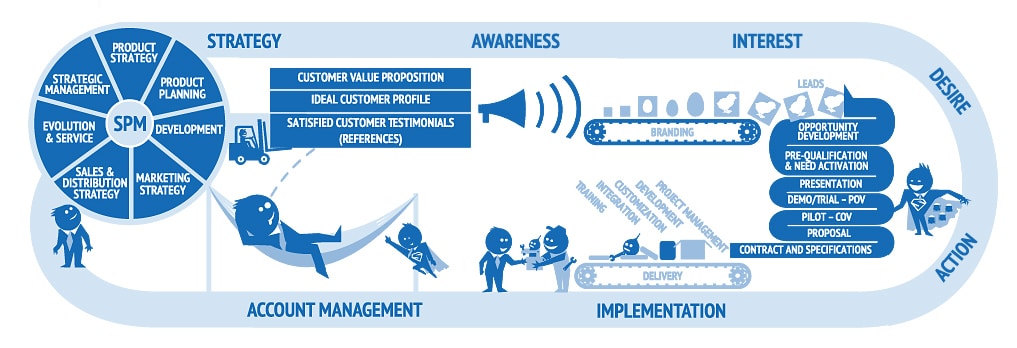Using a channel of independent companies to resell, implement and/or service your customers has a long tradition in the history of the software industry. For some software companies the channel has been a major contributor to global success, but for most software companies making it work is a constant struggle.
The word “channel” is used in the software industry to describe independent companies that assume various roles and obligations in bringing a software product to the customers. The definition is rather broad since the roles and obligations can vary substantially from “simple” reselling to system integration, solution development on top of the software, implementation in terms of consulting, project management, customization, training and support.
The common denominator is the fundamental condition that the individual channel operator is an independent contractor operating at his own expense and at his own risk. Most frequently he is also operating in his own name, but in channels designed as franchises however, this is not the case.
For all the wrong reasons
Why do so many software companies have difficulties in making the channel work?
From our experience with GTM projects in the software industry, there are two major reasons why the channel based GTM fails.
The negative approach
Software companies very often turn to a channel based GTM approach to avoid the investment and risk involved in rapid organic growth. Although this may appear as a solid business reason, the premise is wrong.
How can you expect that someone who is not so familiar with your product and your market should be prepared to make investments and take a risk which you yourself are not prepared to take? The premise is a negative position and your whole approach will be coloured by your risk aversion attitude.
The amateur approach
When a software company with a direct GTM approach decides to apply a channel based GTM they are starting from below zero on the learning curve. For some odd reason software companies with a direct GTM approach tend to substantially underestimate and misjudge what it takes to recruit, enable and grow a channel. They use their staff with a learning curve from present obligations with direct sales and implementation to design and implement the channel based GTM. It will not work.
When and Why?
So what is the magic behind building a successful channel?
There are 3 fundamental requirements for building a successful channel:
The strategy
You must have a proven strategy. This means that you have a tested value proposition, you know which markets to approach and you have a sales and delivery mechanism that has proven replicable and scalable.
The value chain
You must define for which parts of your total value chain and for which parts of delivering the whole product the channel is responsible. These parts must represent attractive and proven business opportunities for potential resellers.

The channel support
You must invest heavily in making your channel productive and profitable.
A channel is not self-motivating. The channel partner has a substantially shorter perspective on investments than you have. And he has other choices. He may be curious and interested in new opportunities, but he will not invest substantially before he sees clear proof of return.
The change in the channel
From our work with clients in the software industry, we see a clear change in the channel landscape.
20 years ago there were fewer products and much fatter margins. Finding channel partners was not so easy, as the market was opaque, but they were easier to recruit, motivate and keep happy. Today products are abundant, margins are slim and the Internet has made most markets extremely transparent.
A software company with an ambition of achieving global success using a channel-based GTM approach must be well prepared, understand the idiosyncrasies of a channel and be ready to invest in walking the learning curve with the channel partners.
Using a channel based GTM approach is not a shortcut to growth and profitability. It is a strategic option next to many other options. If you can make it work you will obtain the benefits of the multiplicator. If you cannot make it work you will be left with little control and manoeuvrability.


Hi Hans Peter,
This is a very good article and completely in line with my own experience, although I must admit I had not yet thought it through to its end conclusion. The world is full of software companies in search of partners who can fulfil their dreams of exponential growth and global presence. But of course only a few succeed. The key question, however, is: what is the alternative? Consider that any growth strategy requires (financial) commitment and time – among many other things – and is therefore risky. Should we concentrate on making the channel strategy work, or is there a better, less costly, less risky, alternative?
Another observation: basically this puts potential Channel Partners in charge of the game, a situation not unlike what we see in Retail industries. Can we develop a consultancy offering for them, the “other side” so to speak, and would that be lucrative? What can we learn from e.g. large retail industries? Can their approaches be brought to the software industry?
Keep well, hope to talk to you again soon,
Frank
Hi Frank,
I believe the are many alternatives, but they all build on a direct approach in the first phases. I find it hard to identify a substitute for doing the first market penetration yourself. However there is no standard recipe for doing this. It has to be individually engineered for each solution. There is a world of difference between a simple personal software tool with a EUR 25 price tag and an enterprise solution requiring customization, implementation and user training. TBK Consult is providing individualized consulting. We are not a hammer trying to make all challenges look like nails.
Hans Peter